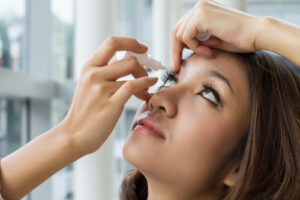Getting through the winter can be challenging, especially around February, when spring is right around the corner. You may long for warmer weather and an end to snowstorms, but it’s necessary to keep your health in mind, especially when it comes to your eyes.
You probably know that dry winter air can be bad for your skin and sinuses, but it can also be detrimental to your eyes. Many people suffer from dry eyes during the winter for this very reason.
But you can prevent your eyes from drying out no matter how cold it gets. Keep reading to find out 6 tips to combat dry eyes this winter!
1. Stay Hydrated

It’s easier to remember to drink water when it’s hot out, but it’s just as important when it’s cold. You may feel like drinking less water since you’re always cold during the winter.
The truth is, you need to drink water every season of the year to stay properly hydrated. Dehydration can be bad for you at the best of times.
When the air is dry, it can be even worse, and yes, it can affect how healthy your eyes are as well. Try and drink enough water, but if you’re struggling, you can also get hydration from decaffeinated and herbal tea.
You can also eat more soup, which can be an easy way to get the water content you need. But you still need to make sure to drink water and beverages with electrolytes that help you retain water so you can stay hydrated.
When you drink enough water, your eyes will feel better. If you have dry eyes, they may feel scratchy, irritated, or even cause blurry vision.
Taking care of your eyes by staying hydrated will help you feel your best, especially during the winter!
2. Be Careful with Indoor Heating

When it’s cold out, you may have the heat inside cranked up. Go ahead and keep your home nice and toasty. While you’re using indoor heating sources, be wary of the air that comes out of the vents.
Even though the air is warm, it can still dry out your sinuses and eyes. To avoid this, try not to keep the heat on too high so that it doesn’t need to blow out hot air constantly.
Also, try not to spend extended periods directly in front of a vent. If it feels like you’re getting too much exposure, you can always buy a humidifier.
A humidifier is a simple and inexpensive way to add much-needed moisture back into your home during the colder winter months.
3. Eat Right

In addition to staying hydrated, you can help your eyes stay healthy by making sure you get the right kind of nutrients. Omega-3 fatty acids help your eyes produce and retain enough moisture.
You can get omega-3s from supplements like fish oil or if you’re vegetarian from flaxseed oil. But you can get more nutrients more efficiently by eating foods that have omega-3s in them.
Foods rich in omega-3 include fish, chia seeds, flax seeds, and walnuts. Dark, leafy greens also contain nutrients that are good for your eyes.
Try incorporating these foods into your daily diet to aid tear production, so your eyes are less likely to dry out.
4. Limit Time Outside

It should go without saying, but you shouldn’t be spending too much time outside when it’s near or below freezing. Being out in near-freezing temperatures can make you sick.
But being around dry air can take its toll on your eyes. Even if you’re all bundled up, the one area of your body that you can’t cover up is your eyes.
Being exposed directly to the cold air is a sure way to dry them out. Try not to spend more than an hour outside in frigid weather, no matter how many layers you’re wearing.
If you know you’re going to spend a lot of time outside, you may want to wear sunglasses. Sunglasses can effectively protect your eyes from the elements and particles like dust and dirt.
5. Reduce Screen Time

While you shouldn’t spend too much time outside, you should also be careful about the time you spend indoors. It can be tempting to spend all your free time in front of the computer, TV, or on your phone, but too much screen time can also dry out your eyes.
Not only that, but it can cause eye strain and headaches. Try not to spend all your time inside on a screen. If you have to spend all day on the computer for your job, be sure to take regular breaks by following the 20-20-20 rule.
Every 20 minutes, take a break to spend 20 seconds looking at an object 20 feet away. Following the 20-20-20 rule helps your eyes briefly recover from staring at a screen and reminds you to blink.
But even with the 20-20-20 rule, you shouldn’t spend all your time looking at a screen if you can help it. Make sure you use eye drops or artificial tears to reduce symptoms if your eyes start feeling dry or irritated.
6. Have Over-the-Counter Medication on Hand

When snowstorms can strike at any time and leave you stuck at home, it’s important to stay stocked up on the necessities. But you may not consider artificial tears to be a necessity.
Well, for many people, they can be. Lubricating eye drops, also known as artificial tears, can give you direct relief if you often get dry eyes. Having them around can prevent you from being stuck in your home, possibly without any heating, suffering from painfully dry eyes.
You can buy them at most drug stores and the pharmacy section of many grocery stores, so consider picking some up the next time you go to the store for essentials.
Have you tried the above tips, and you still can’t get relief from your dry eyes? Schedule an appointment at Omaha Eye & Laser Institute in Omaha, NE, to learn about our dry eye treatment options!


